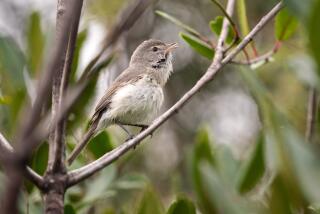Biologists Study ‘Dialects’ : Bird Songs Convey Desire to Mate, Defend Territory
- Share via
When the tiny cowbird breaks into song, members of its species understand the melodious “dialect” that can communicate anything from a desire to mate to an ability to defend local territory.
Biologists specializing in the unusual field of songbird dialects are finding some striking parallels between the biological and social function of language in people and songs in birds.
“There are many shared aspects in the development of human speech and the whistles of songbirds,” said biologist Stephen Rothstein of the University of California, Santa Barbara.
“The various species of songbirds generally learn their whistles just like languages and dialects are learned by people,” he said. “Older birds do not take the younger ones aside to teach them. But the younger birds do learn by example.”
Not Genetic
Rothstein, who studies the brown-headed cowbird of California’s Sierra Nevada Mountains, said he dismisses theories that the birds are genetically programmed to sing certain melodies.
He and his team have found that the cowbird has a variety of vocalizations--dialects--which include a flight whistle that is used only while the birds are flying and a set of different songs usually performed while they are perched together.
“These dialects have to be learned and the birds also have to know when to use certain whistles,” said Rothstein, who describes the songs as the bird’s form of communication.
Other songbirds in the family of blackbirds, to which the cowbird belongs, have similar flight and perching songs but with variations so noticeable that any bird with a dialect from outside of the region is quickly recognized.
Learning Difficulty
The scientist has found that even when an outsider tries to fit in by singing in the regional dialect, the bird can encounter great difficulty trying to learn what amounts to a new lingua franca.
“Just as people learn languages better earlier in life, songbirds learn dialects easier when they are young,” Rothstein said. “But they learn up to a certain point in their development then have difficulty learning new dialects later on.”
Rothstein said his studies suggest that the bird learns the sounds it needs to know for communication during a critical period of development, a biological similarity comparable to the human acquisition of sounds in early childhood that are needed to communicate with others.
Dialects Constant
He said that just as some Bostonians for generations have said “pahk the cah” and probably will persist in doing so for generations to come, songbird dialects also remain constant despite outside influences.
Among other things, a male songbird’s dialect is a way of warning rival males to stay clear of the territory, he said.
Rothstein hypothesizes that songbird dialects play a major role in local mating practices. In fact, so much so that his studies using tape recordings show that female cowbirds prefer males who sing only in the regional dialect.
“This suggests they’re not as interested in males with the foreign dialect as they are in males with the local one,” he said.
Similarly, Rothstein said, people tend to “pigeonhole” those who have minor differences in their speech, often looking down on those who speak with a regional accent.
More to Read
Sign up for Essential California
The most important California stories and recommendations in your inbox every morning.
You may occasionally receive promotional content from the Los Angeles Times.










